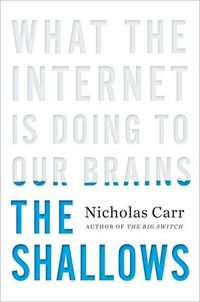

Purchase
What the Internet Is Doing to Our Brains
W. W. Norton & Company
June 2010
On Sale: June 7, 2010
276 pages
ISBN: 0393072223
EAN: 9780393072228
Hardcover
Add to Wish List
Non-Fiction
The best-selling author of The Big Switch returns with an
explosive look at technology’s effect on the mind. “Is
Google making us stupid?” When Nicholas Carr posed that
question, in a celebrated Atlantic Monthly cover story, he
tapped into a well of anxiety about how the Internet is
changing us. He also crystallized one of the most important
debates of our time: As we enjoy the Net’s bounties, are we
sacrificing our ability to read and think deeply? Now, Carr expands his argument into the most compelling
exploration of the Internet’s intellectual and cultural
consequences yet published. As he describes how human
thought has been shaped through the centuries by “tools of
the mind”—from the alphabet to maps, to the printing press,
the clock, and the computer—Carr interweaves a fascinating
account of recent discoveries in neuroscience by such
pioneers as Michael Merzenich and Eric Kandel. Our brains,
the historical and scientific evidence reveals, change in
response to our experiences. The technologies we use to
find, store, and share information can literally reroute our
neural pathways. Building on the insights of thinkers from Plato to McLuhan,
Carr makes a convincing case that every information
technology carries an intellectual ethic—a set of
assumptions about the nature of knowledge and intelligence.
He explains how the printed book served to focus our
attention, promoting deep and creative thought. In stark
contrast, the Internet encourages the rapid, distracted
sampling of small bits of information from many sources. Its
ethic is that of the industrialist, an ethic of speed and
efficiency, of optimized production and consumption—and now
the Net is remaking us in its own image. We are becoming
ever more adept at scanning and skimming, but what we are
losing is our capacity for concentration, contemplation, and
reflection. Part intellectual history, part popular science, and part
cultural criticism, The Shallows sparkles with memorable
vignettes—Friedrich Nietzsche wrestling with a typewriter,
Sigmund Freud dissecting the brains of sea creatures,
Nathaniel Hawthorne contemplating the thunderous approach of
a steam locomotive—even as it plumbs profound questions
about the state of our modern psyche. This is a book that
will forever alter the way we think about media and our minds.
Comments
No comments posted.
Registered users may leave comments.
Log in or register now!
| 


 © 2003-2024 off-the-edge.net
all rights reserved Privacy Policy
© 2003-2024 off-the-edge.net
all rights reserved Privacy Policy